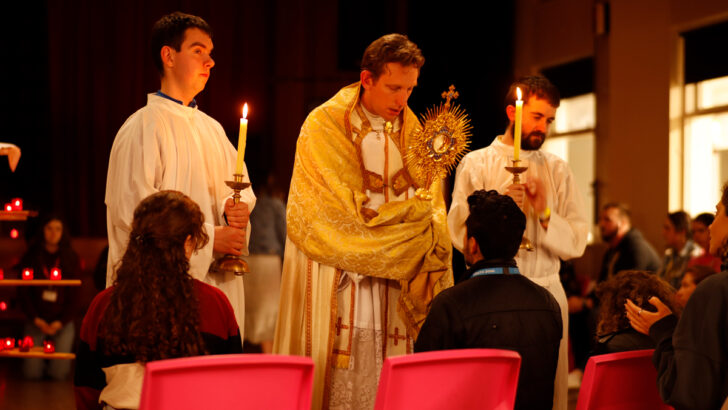Many young adults and teenagers are leaving the Catholic Faith in the background of their lives. Some still consider themselves as Catholics, they go to Mass on Christmas and Easter and engage sporadically with the Church, while others have left the Faith life completely and consider themselves as ‘non-religious’.
Daniela Proano told The Irish Catholic she used to go to Mass and pray with her grandparents regularly, but today she is not a religious person. “When they passed away, we stopped going to Church and practicing Catholicism.”
“Young people would be more religious if they had a role model,” said Ms Proano. “As an example, my brother and his wife are educating their children within the Catholic religion, even though as children we didn’t have that strong influence, my sister in law kept it and has become a role model to their kids.”
Another reason given to this paper as to why the youth is leaving the Church relates to how Mass is kept very traditional and strict. Miran Fronza, who used to be very active at the Church and volunteer in her parish, today only participates in Mass occasionally she said that she found that “priests were impersonal, and Mass was not attractive.”
She also mentioned how priests would always remind people about their debt to God, instead of saying words of comfort and support. She does not openly declare her Catholic faith anymore.
Pressure
Layperson Peter Kasko, member of the Living Water organising team, commented on how peer pressure can influence how comfortable teenagers are to admit their Faith and life as practicing Catholics. Especially because at that stage in life “every single problem can be kind of disproportionately blown up,” he said.
“And combine this with the rather negative view that the general public has about the Catholic Church. Not just here in Ireland, but around the world,” adds to why younger generations would feel reluctant to openly say they are practicing Catholics,” explained the layman.
Being Catholic is living a life of Faith and being true and honest. But it certainly starts from your parents, maybe grandparents, that they bring you up, explain to you what and why”
For Mr Kasko, it comes down to the family environment. The family needs to create “an environment where it is spoken about, where you’re brought up with the knowledge that being Catholic is not a fashion statement.”
“Being Catholic is living a life of Faith and being true and honest. But it certainly starts from your parents, maybe grandparents, that they bring you up, explain to you what and why,” he said. “They should not be afraid of saying when they do not have some answers, and go after them for their children.”
As laypeople, “we probably start with being a witness to the faith,” believes Mr Kasko. “As Saint Francis famously, according to some, said ‘evangelise and use words if necessary.’ So like, be a true witness and evangeliser through your life.”
Evan Cawley, a layperson from Sligo, believes “the real authentic, the Orthodox faith” would attract more people to Church. More traditional Masses would make attendees “feel like you’re taking a force off the Earth and you’re going somewhere more heavenly, more divine and a special place.”
Mr Cawley also mentioned the importance of new people feeling welcome in the Church. “Sometimes when I’m trying to convert people and stuff like that, trying to do some straight evangelisation, I tell them, call them to come to the church, and they might go to some Catholic Church.”
“But when they go in, no one talks to them at all, and then they’re gone. And you know what? If they go to a Protestant church, everyone is shaking their hands, trying to chat and everything.”
A way of keeping these new people in the Church is to host activities. “I think a great thing for after Mass would be tea and biscuits, or a wee talk, Sunday school, I think. And Sunday school not just for teenagers, but also for adults,” said Mr Cawley.
Catechism
He said “the bishops have trained so many catechists and I don’t see any catechism studies anywhere.” Mr Cawley believes it is important to provide activities and events to gather people of faith. However, there are catechism courses offered in Ireland by a number of different outlets.
Peter Kasko also considers “more activities for teenage groups” to be a helpful way “to rope them [youth] in.” A good example of such groups is the ‘Youth 2000’, an organisation founded by Englishman Ernest Williams after he was inspired by Pope John Paul II’s speech at the World Youth Day celebration in 1989.
Dominic Fillion, Youth 2000 Regional Leader for Leinster, told The Irish Catholic about his experience organising retreats for young people in Ireland. He organised the last retreat the group had. It was “a weekend retreat for people aged 16 to 35 with time for adoration,” these kind of retreats also have “different speakers giving talks on the Eucharist or reconciliation, kinds of different sacraments.”
Mr Fillion also explained that these events also have “time for community and fellowship. Time to chat and have meals together.” The last retreat happened at the end of April and gathered 160 young people over the weekend.
Promoting these youth events are key to bring new young people to the Church, it seems. Mr Fillion explained they use social media and hand flyers about all the programmes and events they have organised, “But for the large part that always seems to reach the people who are already kind of in the Catholic circles.”
So the youth that are already inserted in the Catholic faith need to “spread the word”, to give their testimony and “bring people they know who are not yet part of the Church.” The next Youth 2000 event will be a festival happening in August, in Kildare.
Youth 2000 is a donation only organisation, so there is no charge to participate in these events, “you can just show up, bring a sleeping bag.”
There is a suggested donation to participate, but it is not required, as “you don’t want to have a 17 year-old who’s like, here’s this weekend retreat, but it’s €150, and I don’t want to spend that money on something that may or may not be fun.”
Overall, the best way to bring more young people to the Church, and to keep those who are in engaged, is to provide opportunities for evangelisation that are also fun and attractive to younger generations.


 Renata Steffens
Renata Steffens Youth 2000
Youth 2000